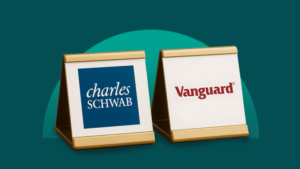High-yield savings account vs. CD: Which should you choose?

Key Takeaways
- High-yield savings accounts (HYSAs) offer liquidity and higher rates than traditional savings accounts.
- CDs tend to offer higher rates than HYSAs, but they require you to lock up your money for a certain amount of time.
- The decision between a HYSA and a CD will come down to your specific goals, timing for those goals and if you need access to your funds.
High-yield savings accounts (HYSAs) and certificates of deposits (CDs) are two ways to boost returns on your savings, and they became especially attractive over the last few years as the Federal Reserve increased interest rates.
Now that inflation has come down and the Fed has cut interest rates, the amount of money you’ll earn on these cash equivalents has also decreased. But HYSAs and CDs can still be a good place to store money you don’t want to invest in the financial markets. Here’s what you should know about each and when you should choose one over the other.
Discover: Highest CD rates today
High-yield savings accounts vs. CDs
High-yield savings accounts and CDs can both present solid options when it comes to your savings. Here’s what you should consider about each:
| High-yield Savings Accounts | CDs | |
|---|---|---|
| Access to money? | Yes, but may be limited to a certain number of monthly withdrawals | Early withdrawals typically come with penalties |
| FDIC-insured? | Yes, if institution is insured | Yes, if institution is insured |
| Interest rate | Significantly higher than traditional savings accounts | May be higher than high-yield savings accounts, depending on CD term |
| Good for | Emergency fund savings, short-term goals | Short-term goals where you’re confident you won’t need the money before the CD matures |
If you’re looking for a place to park short-term savings or money that you may need quick access to, such as an emergency fund, a high-yield savings account is going to be your best option. While CDs may offer slightly higher interest rates, you’ll have to pay a penalty in order to access money held in a CD prior to maturity.
They’re “super liquid and easy to access at any point,” says Catherine Valega, financial advisor and founder Green Bee Advisory of HYSAs. The best high-yield savings accounts offer competitive rates with low or no fees and minimum balance requirements.
Just be sure you don’t put too much money in a savings account, since they tend to offer lower rates than CDs and won’t boost your returns as much as investing it in the financial markets.
While CDs may offer slightly higher interest rates, you’ll have to pay a penalty in order to access money held in a CD prior to maturity. The exception to this are no penalty CDs, which do allow for withdrawals at certain times.
“CDs are great when you know you’re not going to need the funds for that exact time,” Valega says. But if you miss the expiration date, you could be automatically rolled into a new CD at lower rates, she adds.
You may want to use a strategy known as CD laddering, where you invest in CDs of various terms so you’ll have a regular series of CDs maturing in case you need access to the money. The money can then be used or reinvested in another CD to “build back” the last rung in the ladder. This strategy allows you to earn higher rates by reinvesting the money into longer-term CDs.
Interest rates comparison
The interest rates on HYSAs are variable, which means they can change any time — and they likely will. Banks tend to follow the lead of the Fed when it comes to setting interest rates on deposit products, so when the Fed cuts rates, you can expect the rate on your HYSA to eventually fall, too. (But keep in mind that the top high-yield savings accounts are still beating inflation despite their rates dropping).
CDs rates, on the other hand, are guaranteed for the duration of your CD term. For example, if you open a 3-year CD with a 1.39 percent annual percentage yield (APY), you are guaranteed to get that 1.39 percent rate even if the Fed drops interest rates.
That can be a good and bad thing. If your CD is paying a higher interest rate than other savings vehicles, it’s beneficial to be locked in to the rate. But if banks start to offer higher rates elsewhere, you’re still locked into your original CD (and pulling your money out will likely mean paying a penalty).
When to choose a savings account
If you have money that you want to be able to easily get at any time, a savings account is likely the way to go. Financial advisors tend to recommend keeping an emergency fund that would cover three to six months worth of expenses in case of job loss, an unexpected medical bill or another unexpected need.
But other short-term goals can also align well with a high-yield savings account. For example, if you are going on vacation in a few months or are planning an upcoming wedding, you likely want to opt for liquidity.
When to choose a CD
If you have money you’re saving for goals taking place within five years, it may not make sense to invest it in the financial markets. But you also want to earn more on your cash than you might in a savings account.
Enter CDs. When you have money for short-term goals and a good sense of exactly when you’ll need the money, it can be advantageous to open a CD. Because CDs tend to have term lengths of three months to five years, you can be strategic about when you open them. For example, if you are planning to buy a car in a year, you can put your cash in a one-year CD. In one year you’ll have earned interest on that cash and have more to spend on the car.
FAQs about CDs and high-yield savings
Bottom line
High-yield savings accounts and CDs can both help you earn additional interest on your savings. Be sure to understand the differences between the two, and keep in mind that you’ll typically pay a penalty for accessing money held in CDs prior to their maturity date. Meanwhile, high-yield savings accounts are a great place to put your emergency fund savings because you’ll still have easy access to the money if necessary.
Why we ask for feedback Your feedback helps us improve our content and services. It takes less than a minute to complete.
Your responses are anonymous and will only be used for improving our website.







